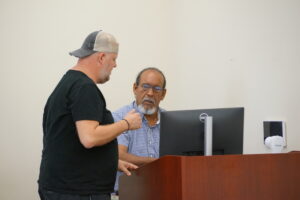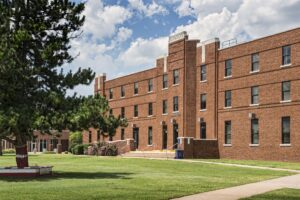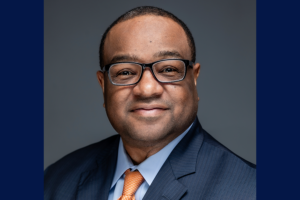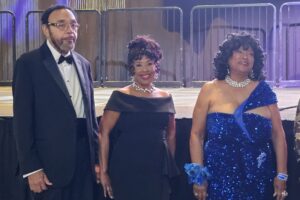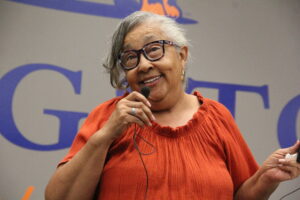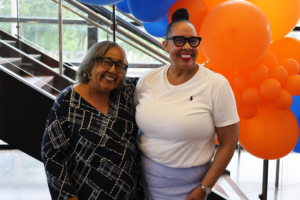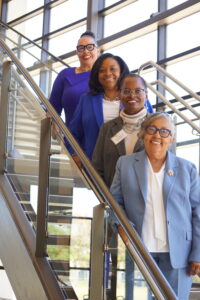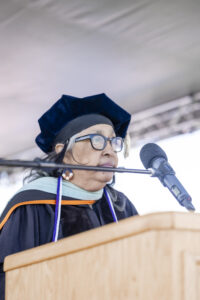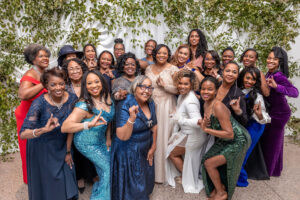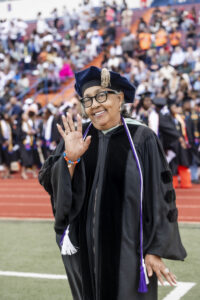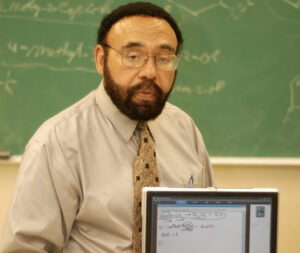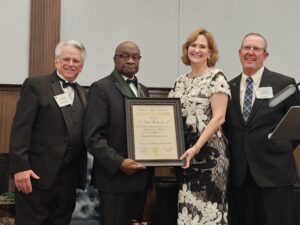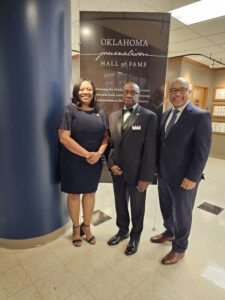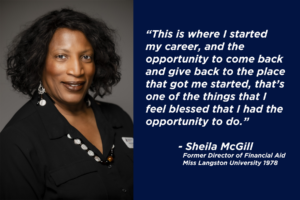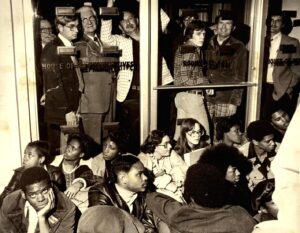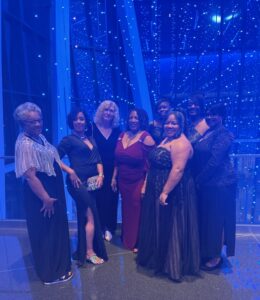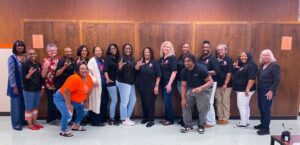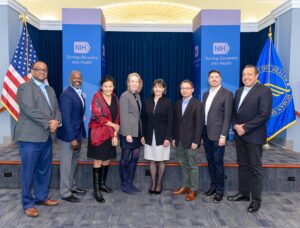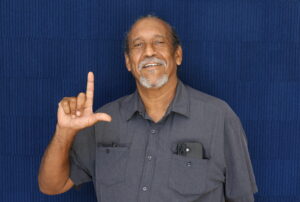
Perseverance: The Story of Dr. Ruben Herron
(This story was originally published in ‘E Roar Digital Magazine | Vol. 2 Issue 6)
by Ellie Melero
Standing at the front of the classroom on a Wednesday evening, Dr. Ruben Herron knows he’s exactly where he’s supposed to be.
As he leads the room of graduate students in an energetic discussion about client-provider dynamics in rehabilitation counseling, it’s hard to imagine there was a time when he felt like he didn’t have a calling. But for most of his early adulthood, Dr. Herron struggled to find his place in the world.
Throughout his 20s and 30s, Dr. Herron tried his hand at several careers, but he could never find a job where he felt truly fulfilled. Years of trial and error in various fields eventually brought him to Langston University to study rehabilitation counseling, and a chance opportunity years later brought him back to LU to teach. Now, he knows there was always a perfect career out there for him.
He just had to find it.
A Rough Beginning
Ruben Herron moved around a lot when he was a kid.
His family was from El Paso, Texas, but his dad was in the Army. As they accompanied him to each new duty station, the Herrons lived in places like Germany and England before eventually making their way to Wichita Falls, Texas.

Photo Credit: Craig Taylor Photo/AdobeStock
When Herron graduated high school, his father offered to pay for him to attend the local community college, but Herron didn’t want to go to school. He decided to enlist in the Marine Corps instead, and he spent a year in California at Camp Pendleton before he got out and moved back to Wichita Falls.
He returned to Texas during the 1980s “oil glut,” and work was hard to find. He took his dad up on his offer to pay for school, but Herron wasn’t a good student and soon dropped out. He got a job doing manual labor at a pipe yard until one Monday, he came to work to find out he’d been laid off.
“Suddenly, we all got pink slips,” Herron said. “And then there were no jobs in Wichita Falls because the big factory shut down. I mean, everybody was getting laid off.”
Herron and his wife decided it was time to leave Texas, so they moved to Tulsa, where his wife’s aunt lived. They arrived in two cars with three kids and a dog, and they were disappointed to find the job market wasn’t much better than it had been in Wichita Falls. Regardless, Herron was determined to provide for his family, and he finally found a part-time job as a sanitation worker.
It was hard, dirty and exhausting work, but Herron persevered. Eventually, he left the trash company for a job at Climate Control. He did his best to provide for his wife and kids, and he was grateful to receive government assistance during those days.
In the late ‘80s, Herron finally felt like he had a breakthrough. He found a new job as a maintenance man for an apartment complex, and he and his family moved out of government housing. For the first time in a while, they even had some money left over after their bills.
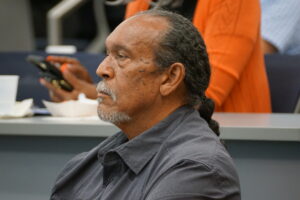
“They paid part of our rent at the apartment complex we was working at, and I was able to pick up a lot of overtime,” Herron said. “And so, we started to move up the ladder a little bit.”
During this time, Herron felt like he was starting to understand the importance of school. A better education could lead to a better job, and Herron wanted a better job. He and his wife decided to start taking classes at Tulsa Community College (TCC) together in bits and pieces as they could afford it.
Despite their improved circumstances, Herron’s success was short lived.
He felt dissatisfied with his life, and he began facing mental health issues. He sought out unhealthy coping mechanisms, and he ended up getting fired from the apartment complex. His marriage suffered because of it, and his wife left him.
Herron fell into a depression. He felt angry, hurt and frustrated, and he didn’t know what to do. He found himself involved in illegal activities, which led him to spend two and a half years in a correctional facility.
“Because of my own stubbornness, my own ignorance, my own selfishness, I chose the path I chose,” Herron said regretfully.
He felt like he had hit rock bottom, and he still has a lot of emotions to process when he thinks about that time. But he soon discovered the only thing to do was keep moving forward.
Never Too Late
When he was released from the correctional facility, Herron was determined not to go back.
He began working at Bennett Steel Inc. as a sandblaster, a job he thoroughly enjoyed because of how peaceful and almost meditative it was. He earned good money, and he felt like he was starting to move up in the world again. Most importantly, Herron met a man who would help him change his life: the company’s owner, Dave Bennett.
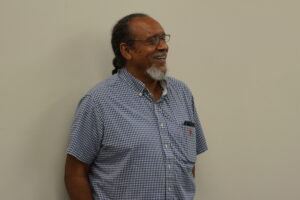
Bennett was a great boss. He cared about his employees’ wellbeing, and he became a mentor for Herron. It meant a lot to Herron to have someone looking out for him. But as time went on, he found himself becoming restless again.
He liked his job and his boss, but he was still dealing with mental health issues. He still felt dissatisfied with his life. He began acting out in small ways, and Bennett noticed immediately.
Bennett wasn’t about to let Herron slip into old habits, so he convinced Herron to see a counselor.
“Through Dave Bennett’s help, I went and started seeing a counselor, which was really, really, really transformative,” Herron said. “She made me go there with myself, but she sort of held my hand. Like, ‘You know this is what you want. You know you want to let it out. Let it out. Trust yourself.’ And that was the biggest process.”
Counseling changed Herron’s life, and he found a kinder, softer version of himself. He learned how to take care of his mental health and how to cope with negative thoughts. He became someone he liked to be.
He continued to see the counselor while he worked at Bennett Steel, but the feelings of restlessness and dissatisfaction never went away completely. Once, he was having a particularly bad day when Bennett walked in, and he realized what he needed to do.
“Dave Bennett walks in, and I said, ‘Dave, will you loan me $375 bucks so I can go back to TCC?’” Herron said. “And he reached in his pocket and said, ‘Yeah.’ So that’s how I started back at TCC.”
In 2001, Herron went back to school. It was hard to study while working full time, and he faced some unexpected challenges, such as rapidly changing technology, but he was determined to see it through.
In 2004, he left Bennett Steel for a job at 12&12 as part of their substance abuse group counseling team, and he finally felt like he had found a calling. This motivated him as he continued his classes at TCC, especially when he worked two jobs in 2006 to buy his first house. In 2009, Herron graduated from TCC.
“I earned my associates after 28 years,” Herron said. “I earned my associates, and I didn’t know what to do. Then, a classmate of mine suggested I come up here (to Langston University), and I met Dr. (John) Sassin, and within five minutes of walking through his door, I was enrolled in the bachelor’s program.”
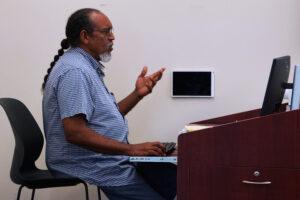
Keeping the Momentum
Herron had learned he could be a good student, and he wanted to keep his momentum going as he pursued a career in counseling. He enrolled at LU-Tulsa in the rehabilitation services bachelor’s degree program in 2009, and he had a better college experience than he could have imagined.
A generous scholarship relieved him of the financial burden of his degree, and he felt like the doors to an untold wealth of knowledge had been opened. His professors became cherished mentors, and he truly understood what it meant to be part of the LU family.
In 2011, Herron had the great honor to walk across the stage at Langston University’s graduation ceremony with his daughter. A couple of months later, he was back in the classroom again as a student in LU’s rehabilitation counseling master’s program.
He continued to work at 12&12, and he continued to enjoy school. One day, Dr. Mary Ramey, an adjunct professor in the rehabilitation counseling program, kicked her shoes off in the middle of class and sat on a table. That behavior baffled Herron, who had always thought of academics as more formal and aloof. But Dr. Ramey seemed normal.
“It just sounds so strange, but that’s what it was to me,” Herron said. “And she looked right at me on that table and said, ‘You could be (a doctor) if you want to.’ And that’s the night it started. She inspired me.”
After that class, Herron contemplated pursuing his doctorate for weeks until one night, he realized that if he wanted to do it, he couldn’t wait.
The day after making that decision, he told Dr. Sassin about his new goal. Having taught and advised Herron for almost four years, Dr. Sassin was supportive of his plan. He helped Herron connect with faculty at the University of Arkansas, and after graduating with his master’s from LU in 2013, Herron enrolled in the University of Arkansas’ doctoral program in counselor education and supervision.
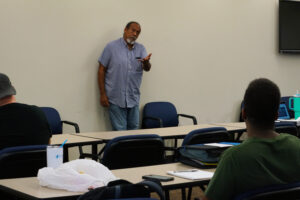
Herron went to school part time, making the two-hour drive to Fayetteville twice a week. It was difficult, and he even ended up sleeping in his car some nights, but he persevered. In 2017, he officially earned his professional counseling license and began working on his dissertation with Dr. Ramey as his dissertation committee chair.
Everyone Has a Place
Unbeknownst to Herron, other LU faculty had been keeping track of his progress throughout his doctoral program, too. In 2017, a faculty position opened in the LU-Tulsa rehabilitation counseling program, and Dr. Phillip Lewis reached out to Herron to invite him to apply.
“He had already gained his CRC and his LPC, which he is a Certified Rehabilitation Counselor and a Licensed Professional Counselor,” said Dr. Lewis, the graduate coordinator for the rehabilitation counseling program at LU-Tulsa. “So, it was a perfect fit for me to bring Dr. Herron in to fulfill that role, because I didn’t lose anything. I just kind of transitioned, and I didn’t have to worry about a person not having the credentials.”
Dr. Herron had never imagined he would become a teacher, but the opportunity to come back to Dear Langston was too good to pass up. He has thrived in the role since then.
Dr. Herron’s teaching style draws a lot on his own life experiences. As someone who has received counseling, administered counseling and studied counseling extensively, he brings invaluable insights into the classroom. His classes are often filled with lively discussions, and students walk away feeling like they’ve learned.
As both a friend and supervisor, Dr. Lewis loves working with Dr. Herron. According to Dr. Lewis, Dr. Herron’s unwavering positive attitude often lifts the spirits of the whole office.
“He’s been an excellent colleague, and to be honest with you, I don’t think I could’ve found better,” Dr. Lewis said. “Him working here, he’s a product of this program. He’s homegrown, you know. And I think it’s a blessing to kind of work your way back home sometimes.”
After so many years of struggling with feelings of dissatisfaction in his life, Dr. Herron is proud to say he loves his job. He has found a balance between work and his family, and all eight of his dimensions of wellness are being fulfilled.
When he was a young man, he never could have guessed where he’d be today. He loves teaching because it allows him to pass down the mentorship that he, too, received at LU, and he feels like he’s giving back to his community. Now that he has found his place in the world, he has no plans to slow down any time soon.
“I would say to young people, old people, it’s never too late,” Dr. Herron said. “If you look at all the possible jobs out there, there is a job for you that you can be passionate about, that you can enjoy doing. So don’t give up. Stay encouraged. Have some faith and trust yourself.”
